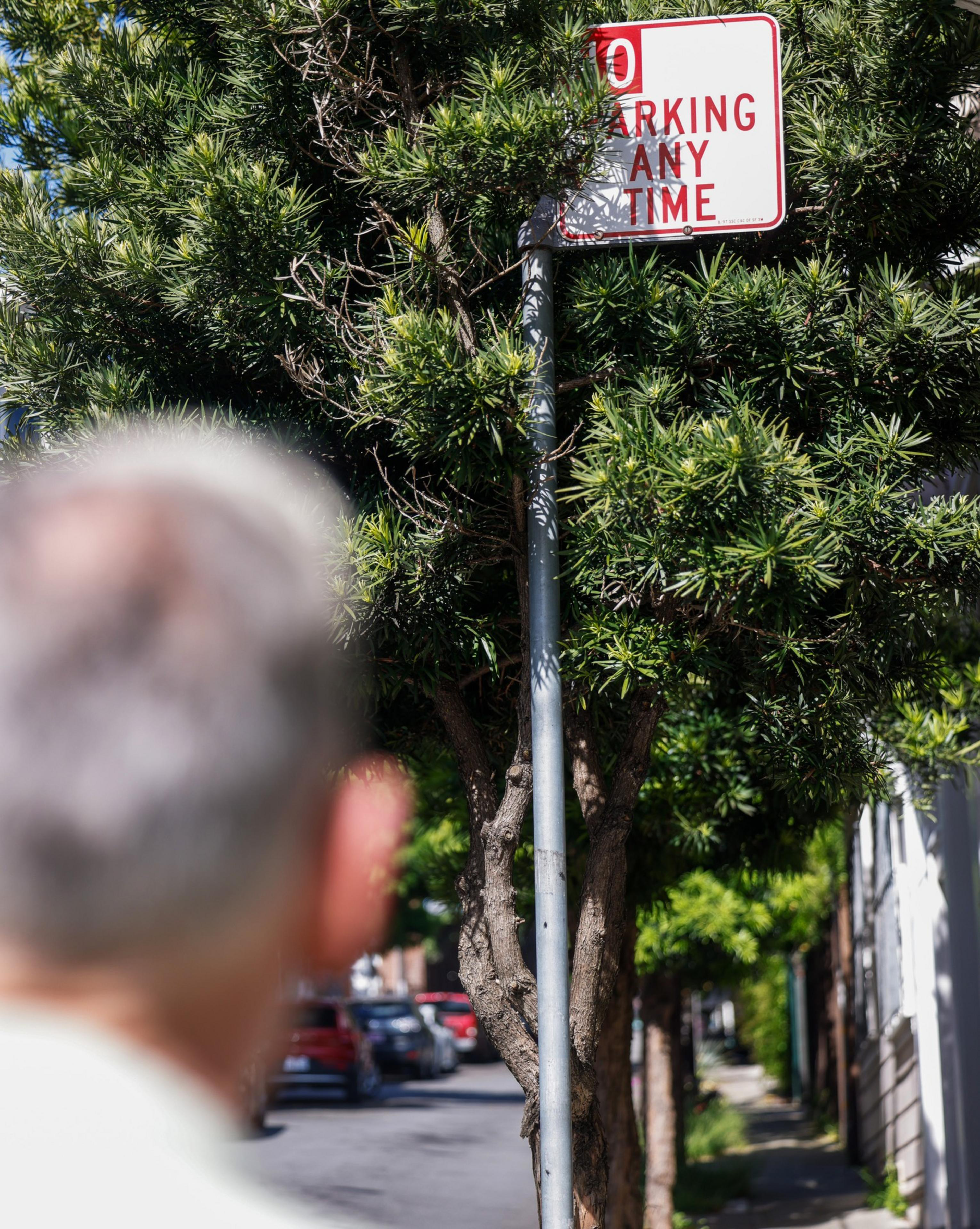Katherine Roberts’ neighbors have spit on her, yelled at her, and on one cold winter night, sprayed her down with a garden hose. Why? She calls parking control to report vehicles that are blocking city sidewalks.
“It is an epidemic in San Francisco that people just don’t respect pedestrian rights of way … they just want to leave their cars pretty much anywhere and they get outraged when they’re prevented from doing that,” Roberts said. “I think that attitude has become so prevalent that they see me as the bad guy.”
More than three decades ago, Roberts was nearly killed when a car that was fleeing police crashed and spun up onto the sidewalk, she said. For Roberts, who has never owned a car and doesn’t have a driver’s license, the experience was a “light bulb moment” illustrating how treacherous navigating a city sidewalk as a pedestrian can be.
“You’re not really protected on that one little strip of pavement,” Roberts said. “And if people start encroaching on that, which they do, then what?”

Roberts is one of San Francisco’s parking informants. Love it or hate it, more and more residents like her are calling 311 (opens in new tab) or using the app to report illegal parking. Their complaints often spark outrage as car owners discover, in the form of a $108 ticket, that they’ve been parking illegally for years. To better understand what’s behind the phenomenon driving residents to post signs begging their neighbors to stop calling in parking complaints (opens in new tab), The Standard interviewed six people who have filed reports on vehicles blocking city sidewalks.
These civic watchdogs operate independently, but they are united by a shared sense of duty. Ranging from seasoned veterans who file complaints daily—Roberts guesses she’s called in thousands over the years—to casual 311 users who might file a report once every couple of months, these transportation advocates are driven by a shared set of frustrations.
They bemoan what they see as the original sin of the city’s street design, which reserves the vast majority of space for vehicles, relegating pedestrians and cyclists to the fringes. They condemn rampant sidewalk blocking, which can threaten the safety of walkers who are forced into the street. And they say that the city has cultivated a sense that blocking the pedestrian walkway is fine by looking the other way for decades.

City data (opens in new tab) indicates that the parking informants’ ranks may be growing. In 2018, the San Francisco Municipal Transportation Agency received about 1,140 parking on the sidewalk 311 reports each month. In 2024, that rate reached about 2,000 monthly reports, a roughly 75% increase.
How a given San Franciscan regards the informants’ work is a Rorschach test for the relationship they think the city should have with cars. Many transportation activists see the whistleblowing as a fair way to keep vehicles out of pedestrians’ lanes and pressure the city to enforce street safety laws that it has allowed to go unchecked for decades. But others view the reporters as anonymous boogeymen who delight in raining down costly fines on their neighbors.
“When these things happen it’s a reminder that we just don’t have that sort of humanity with people you live close to when they’re going to be quick to go toward the extreme route,” said Lori Salipidis. The Richmond neighborhood resident came home one recent evening to find a parking officer about to ticket her partner’s vehicle, which was parked in their driveway overhanging onto the sidewalk, but still leaving space for pedestrians to get by, she said. The parking control officer explained that someone had called in several parking complaints in their area, which spurred the enforcement.
She wishes instead, that whoever reported her vehicle had spoken to her directly about the issue or left a note.
“It’s very upsetting to think that we can no longer trust our neighbors to have your best interest at heart,” Salipidis said.

Robin Levitt, a casual parking informant who calls in a report once every few months, said he tries to use discretion. He spares vehicles only partially blocking the sidewalk, and won’t make a call on someone who appears to be dropping something off quickly. But at the end of the day, he doesn’t think it’s fair for drivers on the receiving end of his reports to cry foul.
“If you’re violating the law and you get caught, are you the victim or the perpetrator?” Levitt said, adding that in this situation, illegal parkers are the perps.
Eric Chen, meanwhile, doesn’t have much sympathy for drivers who habitually leave their vehicles sitting on the sidewalk.
“The city doesn’t owe you a free parking space, and even if you get a citation, that really pales in comparison to the marginalization and danger that vulnerable road users are put in every day,” Chen said.
The 26-year-old software engineer has submitted about 155 illegal parking reports through the 311 app in the past month, with 38 spurring a citation, according to Chen. (The app notifies 311 users if a report they submitted ends in a parking ticket.) At $108 a pop for blocking the sidewalk, Chen’s citations in just the last month could have totaled north of $4,100, according to his rough estimate.
“In a world where drivers really don’t pay their fair share for driving, it feels good to bring them closer to that,” Chen said.

He’s upset that all taxpayers foot the bill for the constant upkeep of city streets, even though drivers take up most of the space in the public way and cause the vast majority of wear and tear. It’s absurd, in Chen’s mind, that San Francisco and other American cities have carved out large swaths of parking spots in shared public spaces that can only be used by car owners, but no other type of private property. After all, the city would surely frown upon a resident setting up a picnic table in a parking spot, but leaving an SUV there is just fine.
All six of the parking informants The Standard interviewed said they didn’t go out looking for parking infractions; they simply called them when they saw them in their day-to-day lives. Anyone living in San Francisco’s residential neighborhoods knows that sidewalk blocking is rampant.
To John Kosich, one root of the problem is SFMTA’s lax enforcement of penalizing the infraction.
“I think it’s not effective at all because I don’t think that the city takes it seriously,” Kosich said of the city’s enforcement effort. Sidewalk blocking, which drives Kosich crazy during his daily dog walks, has only gotten worse during his 19 years living in the Bayview, he said.
“I’ve kept thinking that eventually, the city will start enforcing the rule of no parking on the sidewalks,” Kosich said. “But they don’t.”
Parking citation data (opens in new tab) shows that the city issues by far the most citations for street cleaning, followed by expired meters and staying too long in a residential parking zone. That’s because those are the most common types of violations, according to SFMTA spokesperson Michael Roccaforte.
Meanwhile, sidewalk violations represent just a fraction of those more commonly enforced issues. Roccaforte pointed to pandemic-era staffing challenges as a reason why sidewalk blocking has often gone unticketed. Now, parking control is staffed back up, according to Roccaforte.
“We now have a bigger workforce to enhance enforcement towards safety violations like parking on the sidewalk,” Roccaforte said. “It has never been legal and now that we recover to normal staffing levels after the pandemic, we’re in a better position to enforce these violations.”

Last month, SFMTA Director Jeffrey Tumlin announced that the department would use its refreshed staff resources to deploy intensive parking enforcement operations.
“We want to get the word out that we are finally able to start enforcing the rules,” Tumlin said.
So far, Roberts has not seen any additional enforcement in her neighborhood and it will take more than tough talk to sway her opinion of the agency.
“The jury’s still out because their track record has been so abysmal up until now,” Roberts said.
SFMTA responds quickly to homeowners complaining that someone’s blocking their driveway but takes their sweet time to investigate sidewalk-blocking complaints, according to Roberts. (Roccaforte confirmed that blocked driveways are usually higher priority calls as residents need to get in or out.)
To get around the call system, Roberts and other informers have asked parking control officers they’ve seen out on patrol to ticket specific vehicles they can see parked on the sidewalk. Those officers have consistently declined, the informers said, telling them that they could only ticket the vehicles if someone filed an official over-the-phone complaint.
That does not align with SFMTA policy, according to Roccaforte.
“These violations do not require a complaint as it has always been illegal to park on the sidewalk, but we still respond to complaints when they are logged,” Roccaforte said.
That’s likely little solace to Roberts, who feels that the lackluster city enforcement is what has forced neighbors into conflict with each other over parking issues.
“I shouldn’t have to be putting myself in this situation at all, it’s an extreme failure on the part of the city,” Roberts said. “I’d be very happy if they stepped up and did their jobs so I never, ever had to do this kind of thing again.”
Correction: An earlier version of this story misstated Eric Chen’s age.
